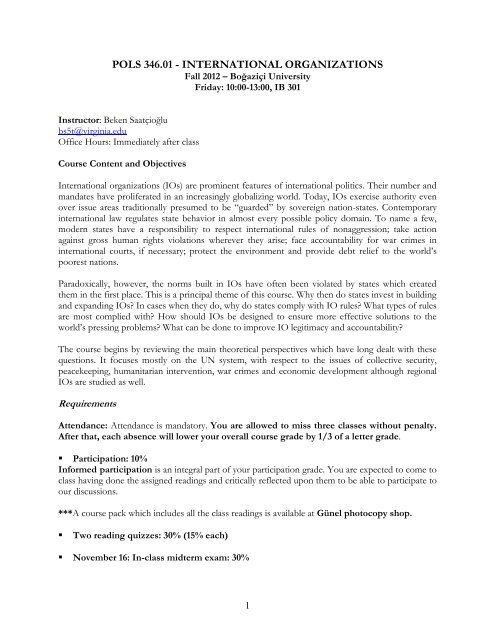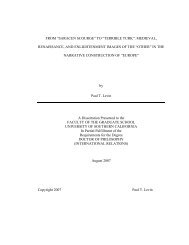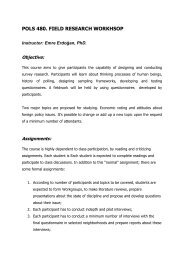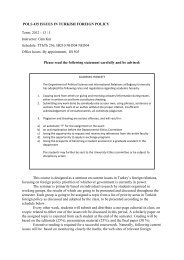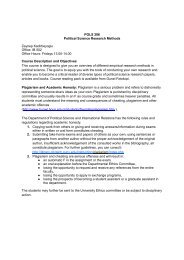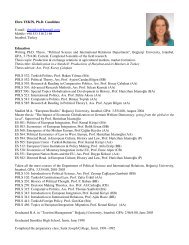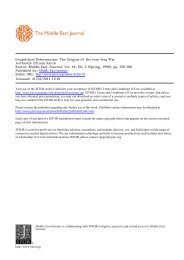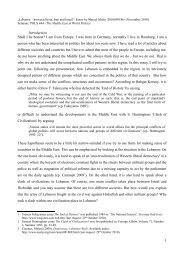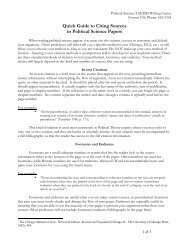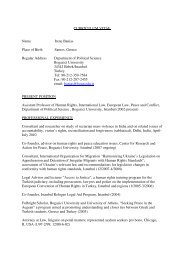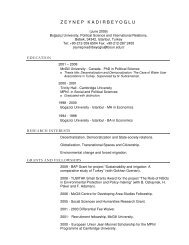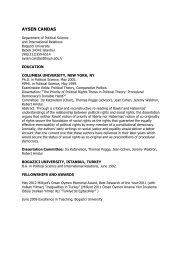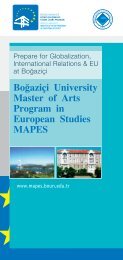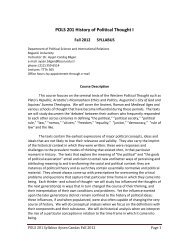International Organizations - Department of Political Science and ...
International Organizations - Department of Political Science and ...
International Organizations - Department of Political Science and ...
Create successful ePaper yourself
Turn your PDF publications into a flip-book with our unique Google optimized e-Paper software.
POLS 346.01 - INTERNATIONAL ORGANIZATIONS<br />
Fall 2012 – Boğaziçi University<br />
Friday: 10:00-13:00, IB 301<br />
Instructor: Beken Saatçioğlu<br />
bs5t@virginia.edu<br />
Office Hours: Immediately after class<br />
Course Content <strong>and</strong> Objectives<br />
<strong>International</strong> organizations (IOs) are prominent features <strong>of</strong> international politics. Their number <strong>and</strong><br />
m<strong>and</strong>ates have proliferated in an increasingly globalizing world. Today, IOs exercise authority even<br />
over issue areas traditionally presumed to be ―guarded‖ by sovereign nation-states. Contemporary<br />
international law regulates state behavior in almost every possible policy domain. To name a few,<br />
modern states have a responsibility to respect international rules <strong>of</strong> nonaggression; take action<br />
against gross human rights violations wherever they arise; face accountability for war crimes in<br />
international courts, if necessary; protect the environment <strong>and</strong> provide debt relief to the world‘s<br />
poorest nations.<br />
Paradoxically, however, the norms built in IOs have <strong>of</strong>ten been violated by states which created<br />
them in the first place. This is a principal theme <strong>of</strong> this course. Why then do states invest in building<br />
<strong>and</strong> exp<strong>and</strong>ing IOs? In cases when they do, why do states comply with IO rules? What types <strong>of</strong> rules<br />
are most complied with? How should IOs be designed to ensure more effective solutions to the<br />
world‘s pressing problems? What can be done to improve IO legitimacy <strong>and</strong> accountability?<br />
The course begins by reviewing the main theoretical perspectives which have long dealt with these<br />
questions. It focuses mostly on the UN system, with respect to the issues <strong>of</strong> collective security,<br />
peacekeeping, humanitarian intervention, war crimes <strong>and</strong> economic development although regional<br />
IOs are studied as well.<br />
Requirements<br />
Attendance: Attendance is m<strong>and</strong>atory. You are allowed to miss three classes without penalty.<br />
After that, each absence will lower your overall course grade by 1/3 <strong>of</strong> a letter grade.<br />
• Participation: 10%<br />
Informed participation is an integral part <strong>of</strong> your participation grade. You are expected to come to<br />
class having done the assigned readings <strong>and</strong> critically reflected upon them to be able to participate to<br />
our discussions.<br />
***A course pack which includes all the class readings is available at Günel photocopy shop.<br />
• Two reading quizzes: 30% (15% each)<br />
• November 16: In-class midterm exam: 30%<br />
1
• In-class final exam: 30%<br />
***These requirements are final <strong>and</strong> will ultimately determine your overall grade in the class.<br />
There will be no additional assignments for those <strong>of</strong> you looking to increase their grades by<br />
the end <strong>of</strong> the semester.***<br />
***It goes without saying that students must show respect for the pr<strong>of</strong>essor <strong>and</strong> classmates. This<br />
means arriving to class a few minutes prior, avoiding distracting behaviors in class <strong>and</strong> turning <strong>of</strong>f<br />
cell phones. Excessive <strong>and</strong> repeated tardiness will not be tolerated. If you’re consistently late to<br />
class, you will not be allowed to attend.***<br />
***Recommendation letter policy: If you need a letter <strong>of</strong> recommendation from me, you should<br />
write a research paper (6-8 pages) so that I can assess your research <strong>and</strong> writing potential for<br />
graduate study. The paper should be submitted sufficiently in advance to give me enough time to<br />
write you a letter.***<br />
ACADEMIC HONESTY<br />
The <strong>Department</strong> <strong>of</strong> <strong>Political</strong> <strong>Science</strong> <strong>and</strong> <strong>International</strong> Relations has the following rules <strong>and</strong><br />
regulations regarding academic honesty.<br />
1. Copying work from others or giving <strong>and</strong> receiving answers/information during exams either<br />
in written or oral form constitutes cheating.<br />
2. Submitting take-home exams <strong>and</strong> papers <strong>of</strong> others as your own, using sentences or<br />
paragraphs from another author without the proper acknowledgement <strong>of</strong> the original author,<br />
insufficient acknowledgement <strong>of</strong> the consulted works in the bibliography, all constitute<br />
plagiarism.<br />
3. Plagiarism <strong>and</strong> cheating are serious <strong>of</strong>fenses <strong>and</strong> will result in:<br />
a) an automatic ―F‖ in the assignment or the exam<br />
b) an oral explanation before the <strong>Department</strong>al Ethics Committee<br />
c) losing the opportunity to request <strong>and</strong> receive any references from the entire faculty<br />
d) losing the opportunity to apply in exchange programs<br />
e) losing the prospects <strong>of</strong> becoming a student assistant or a graduate assistant in the<br />
department<br />
The students may further be sent to the University Ethics committee or be subject to<br />
disciplinary action.<br />
Please refer to the box below for a detailed explanation <strong>of</strong> what constitutes plagiarism.<br />
What is Plagiarism?<br />
Using someone else's ideas or phrasing <strong>and</strong> representing those ideas or phrasing as our own, either on purpose or<br />
through carelessness, is a serious <strong>of</strong>fense known as plagiarism. ―Ideas or phrasing‖ includes written or spoken material,<br />
<strong>of</strong> course—from whole papers <strong>and</strong> paragraphs to sentences, <strong>and</strong>, indeed, phrases—but it also includes statistics, lab<br />
2
esults, art work, etc. ―Someone else‖ can mean a pr<strong>of</strong>essional source, such as a published writer or critic in a book,<br />
magazine, encyclopedia, or journal; an electronic resource such as material we discover on the World Wide Web; another<br />
student at our school or anywhere else; a paper-writing ―service‖ (online or otherwise) which <strong>of</strong>fers to sell written papers<br />
for a fee.<br />
Let us suppose, for example, that we‘re doing a paper for Music Appreciation on the child prodigy years <strong>of</strong> the<br />
composer <strong>and</strong> pianist Franz Liszt <strong>and</strong> that we've read about the development <strong>of</strong> the young artist in several sources. In<br />
Alan Walker's book Franz Liszt: The Virtuoso Years (Ithaca: 1983), we read that Liszt's father encouraged him, at age<br />
six, to play the piano from memory, to sight-read music <strong>and</strong>, above all, to improvise. We can report in our paper (<strong>and</strong> in<br />
our own words) that Liszt was probably the most gifted <strong>of</strong> the child prodigies making their mark in Europe in the midnineteenth<br />
century—because that is the kind <strong>of</strong> information we could have gotten from a number <strong>of</strong> sources; it has<br />
become what we call common knowledge.<br />
However, if we report on the boy's father's role in the prodigy's development, we should give proper credit to Alan<br />
Walker. We could write, for instance, the following: Franz Liszt's father encouraged him, as early as age six, to practice<br />
skills which later served him as an internationally recognized prodigy (Walker, p. 59). Or, we could write something like<br />
this: Alan Walker notes that, under the tutelage <strong>of</strong> his father, Franz Liszt began work in earnest on his piano playing at<br />
the age <strong>of</strong> six (p. 59). Not to give Walker credit for this important information is plagiarism.<br />
Some More Examples:<br />
(The examples below were originally written by the writing center staff at an esteemed<br />
college; that institution has asked us to remove its name from this Web page.)<br />
The original text from Elaine Tyler May's ―Myths <strong>and</strong> Realities <strong>of</strong> the American Family‖:<br />
Because women's wages <strong>of</strong>ten continue to reflect the fiction that men earn the family wage, single mothers rarely earn<br />
enough to support themselves <strong>and</strong> their children adequately. And because work is still organized around the assumption<br />
that mothers stay home with children, even though few mothers can afford to do so, child-care facilities in the United<br />
States remain woefully inadequate.<br />
Here are some possible uses <strong>of</strong> this text. As you read through each version, try to decide if it is a legitimate use <strong>of</strong> May's<br />
text or a plagiarism.<br />
Version A:<br />
Since women's wages <strong>of</strong>ten continue to reflect the mistaken notion that men are the main wage earners in the family,<br />
single mothers rarely make enough to support themselves <strong>and</strong> their children very well. Also, because work is still based<br />
on the assumption that mothers stay home with children, facilities for child care remain woefully inadequate in the<br />
United States.<br />
Plagiarism.<br />
In Version A there is too much direct borrowing in sentence structure <strong>and</strong> wording. The writer changes some words,<br />
drops one phrase, <strong>and</strong> adds some new language, but the overall text closely resembles May‘ s. Even with a citation, the<br />
writer is still plagiarizing because the lack <strong>of</strong> quotation marks indicates that Version A is a paraphrase, <strong>and</strong> should thus<br />
be in the writer's own language.<br />
Version B:<br />
As Elaine Tyler May points out, ―women's wages <strong>of</strong>ten continue to reflect the fiction that men earn the family wage‖<br />
(588). Thus many single mothers cannot support themselves <strong>and</strong> their children adequately. Furthermore, since work is<br />
based on the assumption that mothers stay home with children, facilities for day care in this country are still ―woefully<br />
inadequate.‖ (May 589).<br />
Plagiarism.<br />
The writer now cites May, so we're closer to telling the truth about our text's relationship to the source, but this text<br />
continues to borrow too much language.<br />
Version C:<br />
3
By <strong>and</strong> large, our economy still operates on the mistaken notion that men are the main breadwinners in the family. Thus,<br />
women continue to earn lower wages than men. This means, in effect, that many single mothers cannot earn a decent<br />
living. Furthermore, adequate day care is not available in the United States because <strong>of</strong> the mistaken assumption that<br />
mothers remain at home with their children.<br />
Plagiarism.<br />
Version C shows good paraphrasing <strong>of</strong> wording <strong>and</strong> sentence structure, but May's original ideas are not acknowledged.<br />
Some <strong>of</strong> May's points are common knowledge (women earn less than men, many single mothers live in poverty), but<br />
May uses this common knowledge to make a specific <strong>and</strong> original point <strong>and</strong> her original conception <strong>of</strong> this idea is not<br />
acknowledged.<br />
Version D:<br />
Women today still earn less than men—so much less that many single mothers <strong>and</strong> their children live near or below the<br />
poverty line. Elaine Tyler May argues that this situation stems in part from ―the fiction that men earn the family wage‖<br />
(588). May further suggests that the American workplace still operates on the assumption that mothers with children stay<br />
home to care for them (589). This assumption, in my opinion, does not have the force it once did. More <strong>and</strong> more<br />
businesses <strong>of</strong>fer in-house day-care facilities.<br />
No Plagiarism.<br />
The writer makes use <strong>of</strong> the common knowledge in May's work, but acknowledges May's original conclusion <strong>and</strong> does<br />
not try to pass it <strong>of</strong>f as his or her own. The quotation is properly cited, as is a later paraphrase <strong>of</strong> another <strong>of</strong> May's ideas.<br />
September 28: Course overview <strong>and</strong> introduction<br />
October 5: What are international organizations? Why do they exist? What logics <strong>of</strong> action<br />
guide them?<br />
Karns <strong>and</strong> Mingst, ―The Challenges <strong>of</strong> Global Governance‖, p. 3-34 (in Margaret P. Karns <strong>and</strong><br />
Karen A. Mingst, <strong>International</strong> <strong>Organizations</strong>. The Politics <strong>and</strong> Processes <strong>of</strong> Global Governance, Boulder:<br />
Lynne Rienner Publishers, 2004).<br />
March, James G. <strong>and</strong> Johan P. Olsen, ―The Institutional Dynamics <strong>of</strong> <strong>International</strong> <strong>Political</strong> Orders‖,<br />
<strong>International</strong> Organization 52 (4) (Autumn 1998), p. 943-954.<br />
H<strong>of</strong>fman, Stanley ―World Governance: Beyond Utopia‖ Daedalus 132 (1) (Winter 2003), p. 27-35.<br />
October 12: Rationalist Approaches to <strong>International</strong> <strong>Organizations</strong>: Realism <strong>and</strong> Neoliberal<br />
Institutionalism<br />
Pease, Kelly-Kate, Chapter 3, ―Mainstream Approaches‖, p. 43-73 (in Kelly-Kate Pease, <strong>International</strong><br />
<strong>Organizations</strong>, Perspectives on Governance in the Twenty-First Century, Third Edition, New Jersey: Pearson<br />
Prentice Hall, 2008).<br />
Mearsheimer, John ―The False Promise <strong>of</strong> <strong>International</strong> Institutions‖, <strong>International</strong> Security 19 (3),<br />
(Winter 1994/95), p. 5-49 (read only p. 5-37).<br />
4
Keohane, Robert <strong>and</strong> Lisa Martin ―The Promise <strong>of</strong> Institutionalist Theory‖ <strong>International</strong> Security 20<br />
(1), (Summer 1995), p. 39-51.<br />
October 19: Sociological Approaches to <strong>International</strong> <strong>Organizations</strong>: Constructivism <strong>and</strong><br />
Organizational Theory<br />
Mearsheimer, John ―The False Promise <strong>of</strong> <strong>International</strong> Institutions‖, <strong>International</strong> Security 19 (3)<br />
(Winter 1994/95), p. 37-47.<br />
Wendt, Alex<strong>and</strong>er ―Anarchy is What States Make <strong>of</strong> it‖, (in Art <strong>and</strong> Jervis, eds., <strong>International</strong> Politics:<br />
Enduring Concepts <strong>and</strong> Contemporary Issues, 7 th edition, New York: Pearson/Longman, 2005), p. 61-68.<br />
Gheciu, Alex<strong>and</strong>ra ―Security Institutions as Agents <strong>of</strong> Socialization? NATO <strong>and</strong> the ‗New Europe‘‖,<br />
<strong>International</strong> Organization 59 (Fall 2005), p. 973-1012 (read only p. 973-1003).<br />
Barnett, Michael <strong>and</strong> Martha Finnemore, Rules for the World: <strong>International</strong> <strong>Organizations</strong> in Global Politics,<br />
(Ithaca: Cornell University Press, 2004), p. 1-10 <strong>and</strong> Chapter 2, p. 16-44.<br />
October 26: Religious holiday - No class<br />
November 2: History <strong>of</strong> <strong>International</strong> <strong>Organizations</strong>: Early IOs <strong>and</strong> the League <strong>of</strong> Nations<br />
Bennett, LeRoy <strong>and</strong> James K. Oliver, ―A Great Experiment: The League <strong>of</strong> Nations‖, p. 27-45 (in<br />
Bennett <strong>and</strong> Oliver, <strong>International</strong> <strong>Organizations</strong>: Principles <strong>and</strong> Issues, New Jersey: Prentice Hall, 2002).<br />
The Covenant <strong>of</strong> the League <strong>of</strong> Nations: http://avalon.law.yale.edu/20th_century/leagcov.asp.<br />
Wilson, Woodrow ―The Fourteen Points‖ (excerpts from Wilson‘s address to the U.S. Congress on<br />
8 January 1918).<br />
Carr, E.H. The Twenty Years‘ Crisis, 1919-1939 (New York: Harper <strong>and</strong> Row, 1964), p. 22-88.<br />
Make-up class: Date <strong>and</strong> time to be arranged: Post-World War II System: The United<br />
Nations <strong>and</strong> Collective Security<br />
****************Quiz at the beginning <strong>of</strong> class*************************************<br />
Pease, p. 22-29 <strong>and</strong> p. 103-109.<br />
UN Charter, Chapter VII, available at: http://www.un.org/aboutun/charter/index.html <strong>and</strong> UN<br />
Resolution 1441.<br />
Franck, Thomas M. ―What Happens Now? The UN after Iraq‖ <strong>and</strong> Harold Hongju Koh ―On<br />
American Exceptionalism‖, p. 376-393 (in Hathaway <strong>and</strong> Koh, Foundations <strong>of</strong> <strong>International</strong> Law <strong>and</strong><br />
Politics, New York: Foundation Press, 2005).<br />
Glennon, Michael ―Why the Security Council Failed‖, Foreign Affairs 82 (3) (May-June 2003).<br />
5
November 9: Peacekeeping <strong>and</strong> Humanitarian Intervention<br />
Karns <strong>and</strong> Mingst, ―Peacekeeping‖, p. 306-327.<br />
Barnett <strong>and</strong> Finnemore, ―Genocide <strong>and</strong> the Peacekeeping Culture at the United Nations‖, p. 121-<br />
155.<br />
―Convention on the Prevention <strong>and</strong> Punishment <strong>of</strong> the Crime <strong>of</strong> Genocide‖, available at:<br />
http://www.unhchr.ch/html/menu3/b/p_genoci.htm<br />
Report <strong>of</strong> the <strong>International</strong> Commission on Intervention <strong>and</strong> State Sovereignty, ―The Responsibility<br />
to Protect‖, p. XI-XIII, 11-13, <strong>and</strong> 29-37.<br />
November 16: MIDTERM<br />
November 23: NATO<br />
Pease, chapter 6, ―Regional Security‖, p. 139-156.<br />
Pattison, James ―Introduction‖, p. 1-4; Welsh, Jennifer ―Civilian Protection in Libya: Putting<br />
Coercion <strong>and</strong> Controversy Back into RtoP‖, p. 1-8; Bellamy, Alex ―Libya <strong>and</strong> the Responsibility to<br />
Protect‖, p. 1-7; Pattison, James ―The Ethics <strong>of</strong> Humanitarian Intervention in Libya‖, p.1-7;<br />
Chesterman, Simon ―Leading from behind‖, p. 1-7; Weiss, Thomas ―RtoP Alive <strong>and</strong> Well after<br />
Libya‖, p. 1-6, in Ethics <strong>and</strong> <strong>International</strong> Affairs 25 (3), Fall 2011.<br />
November 30: Human Rights Enforcement <strong>and</strong> Accountability for Crimes against<br />
Humanity<br />
Robertson, Ge<strong>of</strong>frey ―The <strong>International</strong> Criminal Court‖, p. 419-467 (in Robertson, Crimes Against<br />
Humanity. The Struggle for Global Justice, New York: The New Press, 2006).<br />
Kaye, David, ―Who‘s Afraid <strong>of</strong> the <strong>International</strong> Criminal Court?‖, Foreign Affairs, May/June 2011,<br />
Vol. 90 (3), p. 118-129.<br />
December 7: The UN System <strong>and</strong> Development<br />
Pease, chapter 8, ―Development‖, p. 192-224, <strong>and</strong> ―Marxism‖, p. 74-89.<br />
Stiglitz, Joseph, ―The Way Ahead‖, p. 214-252 (in Stiglitz Globalization <strong>and</strong> Its Discontents, New York:<br />
W.W. Norton & Company, June 2002).<br />
Rog<strong>of</strong>f, Kenneth ―The IMF Strikes Back‖, Foreign Policy 134 (January 2003), p. 38-46.<br />
Rog<strong>of</strong>f‘s open letter to Stiglitz, available at: http://www.imf.org/external/np/vc/2002/070202.htm<br />
December 14: European Union<br />
******************************Quiz at the beginning <strong>of</strong> class***********************<br />
6
Karns <strong>and</strong> Mingst, ―The European Union (EU)‖, p. 159-174.<br />
Grabbe, Heather ―Accession Conditionality <strong>and</strong> Its Implications‖, p. 7-38 (in Grabbe, The EU’s<br />
Transformative Power: Europeanization through Conditionality in Central <strong>and</strong> Eastern Europe, New York:<br />
Palgrave Macmillan, 2006).<br />
European Commission, ―Enlargement Strategy <strong>and</strong> Main Challenges 2006 – 2007, including<br />
annexed special report on the EU's capacity to integrate new members‖ (Brussels, 2006), skim p. 2-<br />
10, read carefully p. 15-24, available at:<br />
http://ec.europa.eu/enlargement/pdf/key_documents/2006/Nov/com_649_strategy_paper_en.pd<br />
f<br />
December 21: European Union <strong>and</strong> Turkey<br />
Muftuler-Bac, ―Turkey‘s Accession to the European Union: The Impact <strong>of</strong> the EU‘s Internal<br />
Dynamics‖, <strong>International</strong> Studies Perspectives, 2008 (9), p. 201-219.<br />
European Commission, ―Issues Arising from Turkey‘s Membership Perspective‖, pp. 3-20, 21-27<br />
(skim), 37-41, 46-53, available at:<br />
http://ec.europa.eu/enlargement/archives/pdf/key_documents/2004/issues_paper_en.pdf<br />
European Commission, Negotiating Framework, Luxembourg, 3 October 2005, available at:<br />
http://ec.europa.eu/enlargement/pdf/turkey/st20002_05_tr_framedoc_en.pdf<br />
7


